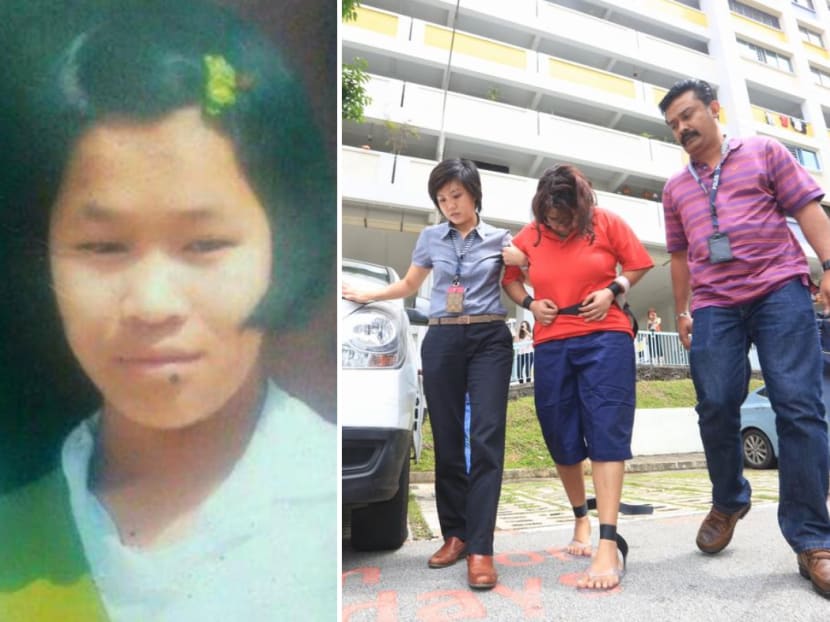Fatal maid abuse: Apex court rejects woman's appeal against 30-year jail term

(Left) An old picture of Piang Ngaih Don. (Right) Gaiyathiri Murugayan in the centre being led by investigators to her Bishan flat in 2016 for a re-enactment of how Piang died.
- Gaiyathiri Murugayan sought a shorter jail term of 12 to 15 years
- Three appellate judges rejected her appeal
- She had repeatedly assaulted Piang Ngaih Don, then aged 24, until she died in 2016
- In her appeal, Gaiyathiri said she had felt pressured to be sentenced so her mother's case could promptly conclude as well
- She pleaded guilty in 2021 to multiple counts of abusing her domestic worker and culpable homicide
SINGAPORE — Three apex court judges on Wednesday (June 29) dismissed an appeal lodged by Gaiyathiri Murugayan, who was jailed for 30 years last year for heinously abusing her domestic worker till she died in 2016.
The Court of Appeal hearing on Wednesday afternoon lasted about an hour, with Gaiyathiri repeating her claims of prison authorities and fellow inmates reportedly abusing her, for instance. She sought a shorter sentence of 12 to 15 years’ jail.
Her victim, 24-year-old Myanmarese Piang Ngaih Don, had lost 40 per cent of her body weight and suffered dozens of scars and external injuries from the months-long abuse.
It led to widespread ire from the public and a High Court judge calling it one of the worst cases of culpable homicide to come before the courts.
Gaiyathiri, 42, appealed against her jail term after pleading guilty to 28 offences.
During sentencing in High Court about a year ago, Justice See Kee Oon said that he would have had “little hesitation” in imposing life imprisonment — as sought by the prosecution — if not for Gaiyathiri’s mental disorders.
She suffered from major depressive disorder and obsessive-compulsive personality disorder, which three psychiatrists agreed had substantially contributed to her committing the offences. Her murder charge was reduced to culpable homicide because of that.
After pleading guilty last year, Gaiyathiri's then-lawyer’s failed in a bid for a gag order prohibiting further reporting on the case, in order to protect her children from adverse media publicity.
She has been remanded in prison since July 26 in 2016, when she was arrested on the day of Piang’s death in the family’s three-bedroom flat along Bishan Street 11.
ALLEGEDLY BULLIED
In May, the Court of Appeal rejected her application for medical records in relation to herself and her mother, after she alleged that they had not been given appropriate treatment and care by the prison authorities.
She also asked for records kept by the prison authorities in relation to her complaints about being allegedly abused physically and sexually by fellow inmates.
The three judges — Judges of Appeal Andrew Phang, Judith Prakash and Steven Chong — said that these records were not relevant in determining whether her plea of guilt was conducted properly or if her sentence was “manifestly excessive”.
On Wednesday, Gaiyathiri rehashed many of these same arguments in a semi-incoherent rant. She appeared via a video-link from prison, with her former lawyer Joseph Chen also present.
The judges had to caution her not to raise these complaints because this was not the appropriate platform to do so. She had spoken about “things at prison… getting from bad to worse”, claiming that prison officers spoke about “gang sex bang” and directed vulgarities at her.
In her written submissions, she raised several other points.
These included assertions that her offences were a result of her psychiatric conditions, as shown by the fact that she had improved to the point of refraining from violence, despite allegedly being bullied or ill-treated, in prison.
She also argued that Justice See failed to consider a diagnosis from Dr Jacob Rajesh, a defence psychiatrist, who had found that she suffered from obsessive-compulsive disorder — a more serious condition than the obsessive-compulsive personality disorder that was diagnosed by the prosecution’s psychiatrist.
She also said that she had felt pressured to be sentenced so that her mother, Prema S Naraynasamy, 61, could be promptly sentenced as well.
Prema and Gaiyathiri’s spouse, suspended police staff sergeant Kevin Chelvam, 42, face 49 and five charges respectively in relation to the abuse. Their cases are before the courts.
NO REASON TO REDUCE SENTENCE
In their judgement on Wednesday, the same three judges said that Gaiyathiri was not allowed to consider Dr Rajesh’s diagnosis in any case.
They said there was also no evidence that the hearing where she pleaded guilty was substantially hastened, because the defence and prosecution had already agreed in December 2018 that proceedings against her would conclude first before Prema’s case proceeded.
The apex court judges said that the stressors Gaiyathiri relied on, including her children’s ill health due to Piang’s supposed bad hygiene, could not provide any excuse for her behaviour.
They agreed with Justice See that she showed a “patent lack of remorse” by seeking to “blame anything and anyone but herself for her offending behaviour”.
She was not prepared to accept responsibility for her actions for a “considerable period” after Piang died, having covered up her role and limited the medical care that the domestic worker received, the judges noted.
As for her psychiatric condition, the three judges said that the High Court had already considered this when she was sentenced. In any case, she appeared to be “making good progress” with her treatment, they added.
Her sentence was thus not manifestly excessive, the factors she raised were "wholly without merit" and there was no basis for appellate intervention, they found.
When the hearing concluded, Gaiyathiri said that she will continue to write to Prime Minister Lee Hsien Loong, adding: "Because it's my life and my mother's life. I cannot die here."








